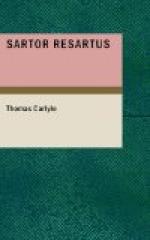Thus from poverty does the strong educe nobler wealth; thus in the destitution of the wild desert does our young Ishmael acquire for himself the highest of all possessions, that of Self-help. Nevertheless a desert this was, waste, and howling with savage monsters. Teufelsdrockh gives us long details of his “fever-paroxysms of Doubt;” his Inquiries concerning Miracles, and the Evidences of religious Faith; and how “in the silent night-watches, still darker in his heart than over sky and earth, he has cast himself before the All-seeing, and with audible prayers cried vehemently for Light, for deliverance from Death and the Grave. Not till after long years, and unspeakable agonies, did the believing heart surrender; sink into spell-bound sleep, under the nightmare, Unbelief; and, in this hag-ridden dream, mistake God’s fair living world for a pallid, vacant Hades and extinct Pandemonium. But through such Purgatory pain,” continues he, “it is appointed us to pass; first must the dead Letter of Religion own itself dead, and drop piecemeal into dust, if the living Spirit of Religion, freed from this its charnel-house, is to arise on us, new-born of Heaven, and with new healing under its wings.”
To which Purgatory pains, seemingly severe enough, if we add a liberal measure of Earthly distresses, want of practical guidance, want of sympathy, want of money, want of hope; and all this in the fervid season of youth, so exaggerated in imagining, so boundless in desires, yet here so poor in means,—do we not see a strong incipient spirit oppressed and overloaded from without and from within; the fire of genius struggling up among fuel-wood of the greenest, and as yet with more of bitter vapor than of clear flame?
From various fragments of Letters and other documentary scraps, it is to be inferred that Teufelsdrockh, isolated, shy, retiring as he was, had not altogether escaped notice: certain established men are aware of his existence; and, if stretching out no helpful hand, have at least their eyes on him. He appears, though in dreary enough humor, to be addressing himself to the Profession of Law;—whereof, indeed, the world has since seen him a public graduate. But omitting these broken, unsatisfactory thrums of Economical relation, let us present rather the following small thread of Moral relation; and therewith, the reader for himself weaving it in at the right place, conclude our dim arras-picture of these University years.
“Here also it was that I formed acquaintance with Herr Towgood, or, as it is perhaps better written, Herr Toughgut; a young person of quality (von Adel), from the interior parts of England. He stood connected, by blood and hospitality, with the Counts von Zahdarm, in this quarter of Germany; to which noble Family I likewise was, by his means, with all friendliness, brought near. Towgood had a fair talent, unspeakably ill-cultivated; with considerable humor of character: and, bating his total ignorance,




